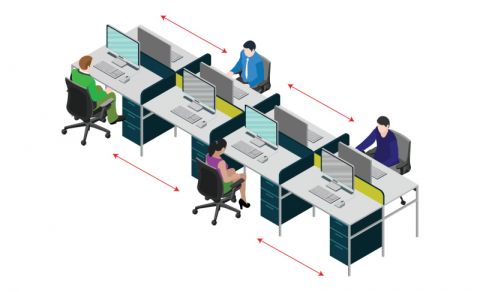
As more and more indoor businesses and public institutions begin to open their doors after the COVID-19 shutdown, what strategies are needed to ensure the reopening is safe and sustainable? This is one of many questions an interdisciplinary team of experts will be discussing in an online panel series this fall.
“The pandemic has presented numerous challenges for workplace law and policy,” says Professor Kevin Banks, Director of Queen’s Centre for Law in the Contemporary Workplace (CLCW). “We’re going to delve into the nature of such challenges facing employers, workers, unions, and government policy-makers, as well as into appropriate responses.”
To do this, the CLCW and Queen’s Employment Relations Program are co-hosting the panel series “COVID-19, Workplace Law, and Workplace Policy.” The first session, “Reopening Safely – Preventing Novel Coronavirus Transmission at Work,” will take place via Zoom on September 25 from noon till 1:30pm.
“Research is beginning to indicate that COVID-19 may be transmissible through aerosol water droplets that are emitted simply by speaking, and that can remain suspended in the air long enough to circulate,” says Banks. “It also appears that there is currently no cost-effective way to screen workers for infection before they enter the workplace.”
Employers, workers, and policy-makers are asking a variety of questions from these findings: Who is likely to be most at risk? Will two-meter distancing and the use of barriers and masks be enough? How should responsibilities and costs associated with reopening be divided between employers, workers, and governments?
To explore these questions and more, a panel of researchers and practitioners in law, public health, industrial relations, philosophy, and other fields will consider a range of topics, including: how the risks of aerosol transmission in an indoor workplace can be mitigated; what information about infection risk employers should provide to workers; what legal and institutional supports does a healthy worker culture need in order to prevent COVID-19 transmission; and where and how regulators and policy-makers should focus initiatives to ensure prevention of the spread of the novel coronavirus at work.
The expert panel is composed of:
- Professor Andrea Ferro, Civil and Environmental Engineering, Clarkson University; President of the American Association for Aerosol Research;
- Professor Robert Hickey, Employment Relations Program, Queen’s University;
- Professor Katherine Lippel, Canada Research Chair in Occupational Health and Safety Law, University of Ottawa; and
- Professor Xavier St-Denis, Social Inequalities, Institut national de la recherche scientifique, Centre Urbanisation Culture Société.
Later this fall, sessions will be held on reopening equitably, balancing safety and privacy rights, and moving towards a principled and evidence-based approach to protecting essential workers.
Practitioners who attend any of the panel series will be eligible for Continuing Legal Education credit.
For more information and to register for the first session, “Reopening Safely – Preventing Novel Coronavirus Transmission at Work,” please visit the CLCW website.
A “pay as you can” registration portal has been set up in support of the Centre for Law in the Contemporary Workplace. Any donation is appreciated but not necessary to attend. All funds collected will be applied directly to CLCW research and programs.